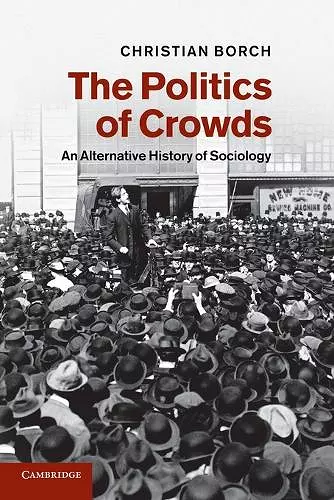The Politics of Crowds
An Alternative History of Sociology
Format:Paperback
Publisher:Cambridge University Press
Published:19th Sep '13
Currently unavailable, and unfortunately no date known when it will be back

This book analyses sociological discussions on crowds and masses since the late nineteenth century, covering France, Germany and the USA.
Modern society was born as a society of crowds. This book analyses how the phenomenon of crowds became a concern to sociologists in the nineteenth century and how the understanding of crowds has evolved since then. The result is a fresh perspective on society and modern sociology.When sociology emerged as a discipline in the late nineteenth century, the problem of crowds constituted one of its key concerns. It was argued that crowds shook the foundations of society and led individuals into all sorts of irrational behaviour. Yet crowds were not just something to be fought in the street, they also formed a battleground over how sociology should be demarcated from related disciplines, most notably psychology. In The Politics of Crowds, Christian Borch traces sociological debates on crowds and masses from the birth of sociology until today, with a particular focus on the developments in France, Germany and the USA. The book is a refreshing alternative history of sociology and modern society, observed through society's other, the crowd. Borch shows that the problem of crowds is not just of historical interest: even today the politics of sociology is intertwined with the politics of crowds.
'There are over seven billion people on the planet, many of them crammed into cities. The result is that a politics of crowds is not a curio. It is a pivotal means of understanding how we are moved by the world. Christian Borch's book is the clearest and best guide you could possibly have to the opportunities as well as the risks.' Nigel Thrift, University of Warwick
'A truly fascinating, learned and deeply thought-provoking reminder of the importance of crowd theory to the discipline of sociology. [The] Politics of Crowds persuasively explains why the 'problem of crowds' would have arisen in both the general and the academic culture of the 1880s, threatened to overwhelm the social sciences through the mid-twentieth century, and then (most fascinating of all) ebbed away again.' John Plotz, Brandeis University
'As The Politics of Crowds usefully reveals the persistent and hidden presence of crowd in social theory and the tensions that are intrinsic in such uncomfortable presence, one cannot but concur with its author in his final call: 'let the spectre of crowds once again haunt sociological thought!'. In short, this almost amounts to a renewal of sociology's own program.' Andrea Mubi Brighenti, University of Trento
'The book traces a series of modifications of 'crowd semantics': disciplinary frontiers, intradisciplinary struggles and historical conditions are brought together to account for the rise and decline of crowds as analytical objects of predilection for sociological research.' Claudia Aradau, Radical Philosophy
'Far more than an essay on the concept of the crowd, [The Politics of Crowds] is a virtual encyclopedia of scholarship and debate about the concept, well documented, clearly written, and full of insight and clarification.' Christopher Kelty, Institute for Society and Genetics, University of California, Los Angeles
'We have here a study that indeed provides novel insights for both the history of sociological thought as well as for the sociology of modernity, given that the book covers major experiences of late-nineteenth- and twentieth-century European and North American socio-political life and their interpretations by concerned, scholarly informed and often politically motivated actors. The book delivers a narrative that may defy some concerns of methodology or intra-disciplinary positioning, as the author is well aware, but that increases our understanding of both the sociological enterprise and the world we live in. As such, it is without doubt a remarkable achievement.' Peter Wagner, ICREA and University of Barcelona
'In this authoritative, extremely learned and well organized book, Christian Borch, who is Associate Professor of Political Science at the Copenhagen Business School, traces the development of a specific 'crowd semantics' that cuts across the history of sociology since its inception … Borch makes a powerful argument that, despite their being increasingly marginalized or reconfigured, crowds have remained as sort of indelible residuum of all sociological theories and categories that form the backbone of twentieth-century sociological lexicon.' Journal of Cultural Economy
'This is a powerful and interesting interpretation of the history of sociology … In bringing the crowd in from the cold, Borch has done a great service to sociologists, political scientists and social psychologists.' John Scott, Acta Sociologica
- Winner of Book Prize, Section on Sociological Theory, American Sociological Association 2014
ISBN: 9781107625464
Dimensions: 229mm x 152mm x 20mm
Weight: 510g
348 pages